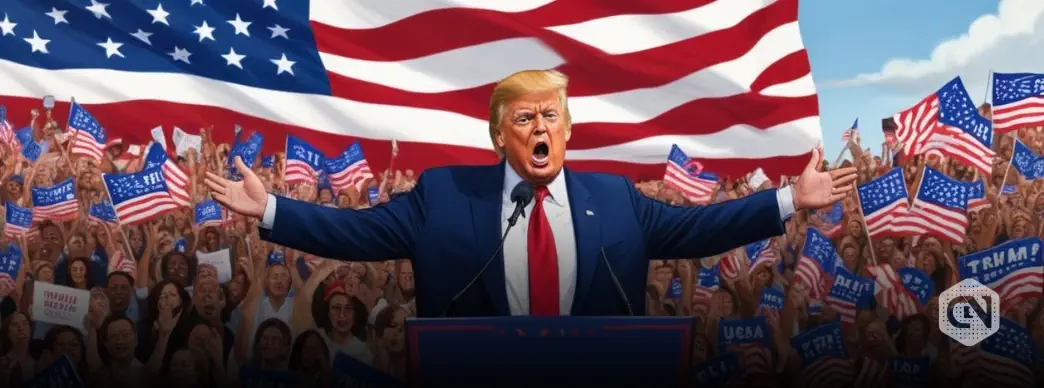One year ago, Donald Trump was a vocal critic of cryptocurrencies, labeling Bitcoin as a “scam” and expressing concerns over its association with illegal activities. Today, as he campaigns for a potential return to the White House in 2024, Trump’s stance has dramatically changed. He now embraces digital assets as part of his broader economic strategy. His vision includes leveraging crypto to stimulate the U.S. economy, lower inflation, and attract global investment, while easing regulatory hurdles that hinder crypto adoption.
Trump’s Crypto Journey: From Skepticism to Advocacy
2019–2021
Initially, Trump maintained a skeptical view of cryptocurrencies. His administration took regulatory actions against crypto companies like Ripple, signaling a strict approach to the industry.
May 2024
In a surprising pivot at a Mar-a-Lago event, Trump voiced his support for crypto. He hinted at policies that would bolster the digital asset sector. He also began selling NFTs linked to his campaign, marking his first direct involvement with digital assets.
June 2024
Crypto donations to Trump’s campaign surged. High-profile figures like the Winklevoss twins and Kraken co-founder Jesse Powell contributed millions in Bitcoin and Ethereum. Trump officially began accepting Bitcoin donations.
July 2024
At a major Bitcoin conference in Nashville, Trump outlined his plan to make the U.S. the “crypto capital of the planet.” He promised to roll back restrictive regulations on cryptocurrencies, especially Bitcoin mining. His campaign highlighted the economic benefits of deregulating the crypto sector. He suggested that Bitcoin could play a major role in the country’s economic revival.
September 2024
Trump made his first public Bitcoin transaction, paying for burgers at a New York bar. This was the first time a former U.S. president publicly used Bitcoin for a transaction, solidifying his crypto-friendly image.
Potential Benefits of Crypto Integration for the U.S.
Economic Growth and Investment
Trump believes that deregulating the crypto sector can attract massive global investment. The U.S. could position itself as a global hub for blockchain innovation, drawing in venture capital and entrepreneurial talent. Cities like Miami and New York, already establishing themselves as crypto-friendly zones, could become global financial centers for digital assets.
Job Creation
With reduced regulatory burdens, the crypto industry could expand rapidly. This expansion could create thousands of high-paying jobs in tech, finance, and blockchain development. Trump’s focus on cutting federal employees could be offset by this boom in private-sector jobs as blockchain companies scale up operations.
Innovation in Finance
Blockchain technology could revolutionize the financial system. It offers faster, cheaper, and more secure ways to conduct transactions. Trump’s deregulation plans could stimulate innovation in DeFi platforms. This would allow Americans to access banking services without traditional banks, benefiting the unbanked and underbanked populations.
Lowering Inflation
Trump emphasizes the need to lower inflation, and cryptocurrency could play a role in that effort. By fostering a crypto-friendly environment, the U.S. could attract capital inflows into Bitcoin and other digital assets. This could reduce reliance on traditional fiat currencies. Additionally, stablecoins pegged to real-world assets could offer a hedge against inflation, providing Americans with an alternative store of value.
Enhancing National Security
Properly regulated cryptocurrencies could provide a secure alternative to traditional payment systems. By integrating crypto, the U.S. could reduce its reliance on foreign financial systems. This would create a more resilient domestic financial infrastructure, especially as cyberattacks on banks and financial institutions rise.
Blockchain for Government Transparency
Trump’s vision for reducing the size of the federal government could be complemented by blockchain technology. Blockchain offers transparency in government operations. Smart contracts could manage public spending, ensuring accountability and reducing waste.
Digital Identity and Voting
Exploring blockchain for secure digital identity verification and voting could make elections more transparent and verifiable. This would address concerns about election integrity, an issue Trump has championed in previous campaigns.
Donald Trump’s newfound support for cryptocurrency represents a significant shift from his earlier skepticism. Integrating crypto into his “Make America Great Again” vision could offer numerous benefits—from economic growth and job creation to enhancing national security and financial innovation. As Trump positions himself as a pro-business, pro-crypto candidate, his presidency could usher in a new era for digital assets in America. The U.S. could become a global leader in the cryptocurrency space. However, it remains to be seen how these policies will unfold and whether the benefits will outweigh potential risks.
Credit: Source link















































